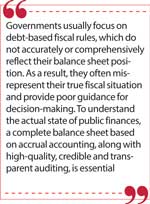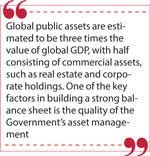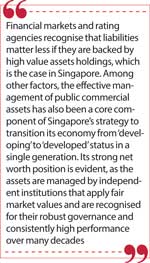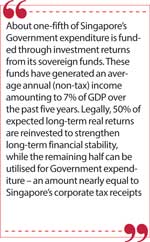Thursday Feb 19, 2026
Thursday Feb 19, 2026
Wednesday, 13 August 2025 00:00 - - {{hitsCtrl.values.hits}}

Singapore demonstrates what can be achieved with good governance, strict fiscal discipline and effective balance sheet management
By Hanan Amin-Salem, Ian Ball and Dag Detter
 Singapore is one of the few remaining sovereigns in the world that still holds a triple-A rating – the highest possible level – despite a gross Government debt-to-gross-domestic-product ratio that is higher than that of many other developed economies, namely Greece, Italy, the US and France. Yet this high level of gross debt does not constrain Singapore’s sovereign credit assessment by global rating agencies.
Singapore is one of the few remaining sovereigns in the world that still holds a triple-A rating – the highest possible level – despite a gross Government debt-to-gross-domestic-product ratio that is higher than that of many other developed economies, namely Greece, Italy, the US and France. Yet this high level of gross debt does not constrain Singapore’s sovereign credit assessment by global rating agencies.
Other considerations – including institutional strength, fiscal performance, monetary policy credibility and effectiveness, and the sustainability of growth – still play significant roles in determining sovereign creditworthiness. However, the main country-specific fiscal factor affecting bond yields appears to be Government net worth (assets minus liabilities) rather than gross debt-to-GDP.
This is the key finding of a study on a set of developed country capital markets. While this conclusion may be ‘deeply grounded in economic intuition’ as Jemima Peppel-Srebrny puts it, it challenges the assumptions on which most practice in public finance – focusing almost exclusively on debt and deficit metrics – is based. This is not to say that debt and deficits are not important, but rather that assets – especially liquid or commercial assets – also matter.
Anchoring net worth
An International Monetary Fund working paper asserts that a net worth anchor encourages public investment and economic growth while enabling sensible policy responses to fluctuations in long-term interest rates. It suggests that a net worth target is directly relevant to the reform of fiscal frameworks, such as the euro area’s framework, to allow for public investment in a high-debt environment. Furthermore, earlier IMF working papers found that Governments with stronger net worth recover faster from recessions and have lower borrowing costs, providing additional rationale for a focus on net worth.
 Financial markets and rating agencies recognise that liabilities matter less if they are backed by high value assets holdings, which is the case in Singapore. Among other factors, the effective management of public commercial assets has also been a core component of Singapore’s strategy to transition its economy from ‘developing’ to ‘developed’ status in a single generation. Its strong net worth position is evident, as the assets are managed by independent institutions that apply fair market values and are recognised for their robust governance and consistently high performance over many decades.
Financial markets and rating agencies recognise that liabilities matter less if they are backed by high value assets holdings, which is the case in Singapore. Among other factors, the effective management of public commercial assets has also been a core component of Singapore’s strategy to transition its economy from ‘developing’ to ‘developed’ status in a single generation. Its strong net worth position is evident, as the assets are managed by independent institutions that apply fair market values and are recognised for their robust governance and consistently high performance over many decades.
Over the past 60 years, the city-state has managed its public finances with strict fiscal discipline embedded in a long-term strategy that has allowed it to build one of the world’s largest sovereign portfolios. This includes assets managed by its public wealth fund, Temasek, which handles its corporate assets and real estate, as well as its sovereign fund GIC; and the Monetary Authority of Singapore, which oversees its surplus liquidity and holds sizable foreign exchange reserves. Collectively, these funds are estimated to amount to three to four times Singapore’s annual GDP, surpassing the size of the sovereign funds of several resource-rich countries such as Norway and Saudi Arabia. Singapore has employed borrowing not to meet current expenses or to fund a deficit, but to build a strong balance sheet.
Governments usually focus on debt-based fiscal rules, which do not accurately or comprehensively reflect their balance sheet position. As a result, they often misrepresent their true fiscal situation and provide poor guidance for decision-making. To understand the actual state of public finances, a complete balance sheet based on accrual accounting, along with high-quality, credible and transparent auditing, is essential.
 Global public assets are estimated to be three times the value of global GDP, with half consisting of commercial assets, such as real estate and corporate holdings. One of the key factors in building a strong balance sheet is the quality of the Government’s asset management. But aside from New Zealand, which introduced accrual accounting about three decades ago – allowing the Government to record and value all its assets and liabilities at fair market value – few Governments make any serious effort to produce a balance sheet. Those that do happen to overlook large portions of assets, not least real estate, which alone is estimated to have a total value equivalent to global GDP.
Global public assets are estimated to be three times the value of global GDP, with half consisting of commercial assets, such as real estate and corporate holdings. One of the key factors in building a strong balance sheet is the quality of the Government’s asset management. But aside from New Zealand, which introduced accrual accounting about three decades ago – allowing the Government to record and value all its assets and liabilities at fair market value – few Governments make any serious effort to produce a balance sheet. Those that do happen to overlook large portions of assets, not least real estate, which alone is estimated to have a total value equivalent to global GDP.
The Singapore case
Effective asset management provides various significant advantages. Turning again to Singapore’s example, we note that about one-fifth of Singapore’s Government expenditure is funded through investment returns from its sovereign funds. These funds have generated an average annual (non-tax) income amounting to 7% of GDP over the past five years. Legally, 50% of expected long-term real returns are reinvested to strengthen long-term financial stability, while the remaining half can be utilised for Government expenditure – an amount nearly equal to
Singapore’s corporate tax receipts.
By demonstrating more diverse revenue streams, including both tax and non-tax sources, Governments reduce their risk profile. At a time when many Governments are actively seeking resources to meet pressing investment needs, policy-makers should heed such lessons and consider prioritising a balance sheet approach in budget decisions. Extensive portfolios of commercial assets, including real estate and state-owned enterprises, are often systematically and significantly undervalued even in the official accounts of Governments that do produce a balance sheet. This may not only worsen economic challenges, but it also, most importantly, obscures the opportunity costs of poor asset management.
To create greater fiscal space in order to achieve their strategic objectives, policy-makers should consider adopting net worth-driven financial decision-making and oversight, investing in and managing assets and liabilities in accordance with long-term priorities.
 Singapore demonstrates what can be achieved with good governance, strict fiscal discipline and effective balance sheet management. While the city-state is idiosyncratic in many ways, it does present best practices that other countries – even those that, like Singapore, lack natural resources – can take on board to enhance their fiscal and economic position.
Singapore demonstrates what can be achieved with good governance, strict fiscal discipline and effective balance sheet management. While the city-state is idiosyncratic in many ways, it does present best practices that other countries – even those that, like Singapore, lack natural resources – can take on board to enhance their fiscal and economic position.
Ensuring sustainable prosperity requires policy-makers to focus on better managing the public balance sheet and the level of net worth – not because it’s easier, but because it offers one of the greatest opportunities to revitalise an economy, as well as a policy tool that is within the control of Governments to implement.
(Hanan Amin-Salem is Global Head of Sovereign Advisory at Citi, Ian Ball is Adjunct Professor, Victoria University of Wellington, and Dag Detter is Principal of Detter & Co.)(Source: https://www.omfif.org/2025/07/ both-Government-liabilities-and-assets matter-for-sovereign-risk/)